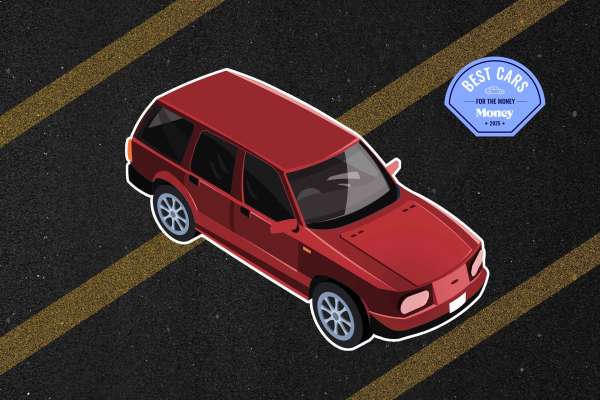The Best Small SUVs of 2025

It's no wonder small SUVs are so popular with American consumers: They combine the versatility of a utility vehicle with the handling of a car.
We tested dozens of the latest models for performance, fuel efficiency and daily usability. First-time SUV shoppers may be surprised to learn that many models even cost less than the average sedan.
We used a step-by-step methodology to compare the small SUVs on the market, considering such factors as value for money, safety and performance. Below are our five top choices and how each may appeal to drivers looking for more space without sacrificing handling or gas money. We’ve listed the specs along with the pros and cons of each pick.
(If you’re interested in a broader look at the new vehicle marketplace, check out our full list of the Best Cars of 2025.)
Best Small SUVs of 2025
Best Overall: Hyundai Tucson
Best for Luxury: Cadillac XT4
Best for Safety: Kia Sportage
Best for Affordability: Nissan Kicks
Best to Buy Used: Honda HR-V
Reviews of Best Small SUVs
Best Overall: Hyundai Tucson
- Price: $28,605
- Mileage: 25 mpg city/33 mpg highway
- Plenty of cargo space
- Also available as hybrid
- Slow acceleration
Starting at $28,605, the Hyundai Tucson teems with upscale upgrades for 2025, including sportier styling, a standard 12.3-inch touch screen and a baby mode that dulls the throttle response, so young passengers aren't jolted by rapid acceleration.
The five-passenger Korean compact SUV shares much the same engine, fuel economy and interior as the Sportage, along with an industry-leading five-year/ 60,000-mile limited warranty and 10-year/ 100,000-mile powertrain warranty. The powertrain produces a quiet ride better described as smooth than sporty.
Also, like the Kia, the Tucson is available in a hybrid version. Starting at $33,365, this dual-powered SUV is about $5,000 more expensive than the base model, but provides an estimated 38 mpg in both city and highway driving.
Best for Luxury: Cadillac XT4
- Price: $41,990
- Mileage: 24 mpg city/29 mpg highway
- Huge, impressive touch screen
- Affordable starting price for a luxury SUV
- Noisy ride
Yes, it is possible to get into a luxury SUV for around the $40,000 mark. The 2025 Cadillac XT4 is cute and compact, yet also refined. The 2025 version of this five-passenger crossover – that is, car-like SUV – comes with more standard safety features, including adaptive cruise control, side bicyclist alert and a 360-degree camera system.
The ride can be noisy, but the XT4’s 235-horsepower engine provides enough muscle for highway driving and delivers above-average fuel economy.
The Cadillac’s cabin feels reasonably luxurious for the price, with perforated leather upholstery and a heated, leather-wrapped steering wheel available. The showpiece is a curved, futuristic 33-inch LED touch screen that dominates the dashboard.
Best for Safety: Kia Sportage
- Price: $27,190
- Mileage: 25 mpg city/32 mpg highway
- Plenty of cargo space
- Also available as hybrid
- Slow acceleration
Starting at $27,190, the 2025 Kia Sportage is well stocked with safety features and has a well-appointed cabin with an 8-inch touch screen with Apple CarPlay and Android Auto, along with comfortable seating for five.
The SUV’s engine is sufficient for most driving conditions. The Sportage drives smoothly over pavement and brakes responsively to produce a balanced ride. However, like many vehicles at this price point, it can feel underpowered when passing cars on the highway.
Even the base model comes with an impressive package of safety features including a forward collision warning with pedestrian and cyclist detection, a lane-keep assist and rear parking sensors.
The Sportage also stands out with class-leading cargo space: nearly 40 cubic feet of room behind the second row and 74.1 cubic feet with the back row folded down – enough for an IKEA haul.
The Sportage has a lot in common with the Kia Sportage, including a roomy cabin, copious cargo space, stellar fuel economy and generous warranty. The five-year/ 60,000-mile limited warranty and 10-year/ 100,000-mile powertrain warranty for both vehicles is the most comprehensive of any model on this list.
Also like the Tucson, the Kia is available in a hybrid version. Starting at $29,965, the Kia hybrid is less expensive than its cousin and has better fuel economy: 44 mpg in the city and 41 mpg on the highway.
Best for Affordability: Nissan Kicks
- Price: $21,830
- Mileage: 28 mpg city/35 mpg highway
- Well-appointed cabin
- Affordable
- Underpowered engine
Redesigned for 2025, the new Nissan Kicks represents one of the best deals for the money. Its previously bare-bones cabin now sports a major upgrade with comfortable, supportive seats, plenty of head- and leg room and higher-end materials.
The base model starts at $21,830 and comes with a 7-inch touch screen and a long list of safety features, including blind-spot monitoring. However, we recommend the $23,680 SV model for a 12.3-inch screen with Apple CarPlay and Android Auto capability.
The SUV’s main drawback is that its engine can lack oomph when merging onto the highway or changing lanes. But the Kicks is adequate for driving around town and, at an estimated 28/ 35 city/highway mpg, a fuel-efficient commuter car as well.
Best to Buy Used: Honda HR-V
- Price: $25,400
- Mileage: 26 mpg city/32 mpg highway
- Affordable price
- Good fuel economy
- Underpowered engine
The Honda HR-V stands out for its budget-friendly perks. Starting at $25,400, the brand’s smallest SUV is a workhorse with a comfortable cabin, adequate powertrain for city driving, and sufficient design flair – like a leather-wrapped steering wheel and shift knob – to keep it from feeling bare-bones.
Its engine is underwhelming but provides enough power to get around town. The HR-V’s above-average fuel economy makes it especially wallet-friendly, as does the brand’s reputation for holding its value and long-term reliability, which will save you money over time.
Save even more by buying used, through the HondaTrue Certified+ program, a standout for nearly-new vehicles. To qualify, HR-Vs must be under a year old with fewer than 12,000 miles on the odometer that pass a 182-point inspection.





